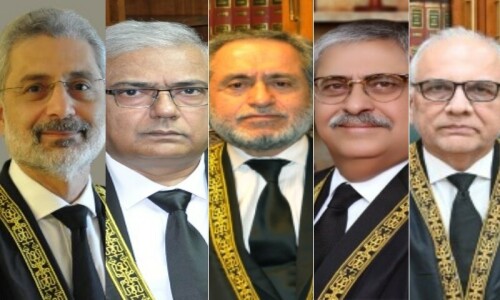ISLAMABAD: Since earlier proceedings, taken up by a three-member bench challenging changes made by parliament to the NAB law, did not to satisfy the requirements of the Supreme Court (Practice and Procedure) Act 2023, proceedings in the matter could be started afresh if the counsel managed to “make a solid case” for the same.
Such were the hints dropped by Chief Justice Qazi Faez Isa as a five-member bench took up intra-court appeals (ICA) against the Sept 15 judgement which restored corruption cases against public representatives by striking down some sections of the amendments made to the accountability law by the PDM government.
Though it refused to stay proceedings in corruption cases underway in accountability courts, the apex court restrained trial courts from announcing their final orders till the next hearing of the appeals in the matter.
These trial courts had resumed the hearings after the Sept 15 majority verdict restored corruption cases against public representatives.
Apex court stops judges from giving verdicts in graft cases until next hearing of appeals
The apex court was seized with a number of ICAs moved by the federal government as well as by a private citizen Zuhair Ahmed Siddiqui, who was an accused in a corruption case but not a party to the challenges to NAB amendments case.
The larger bench also issued notices to the respondent, PTI Chairman Imran Khan, with a direction that since he was incarcerated, the notice should be delivered to him through the jail superintendent concerned.
Notices were also issued to Attorney General for Pakistan Mansoor Usman Awan and advocate generals of the provinces through Section 27A of the Civil Procedure Code.
Senior counsel Farooq H. Naek represented the private citizen, whereas Advocate Saad Hashmi appeared on behalf of the federal government since lawyer Makhdoom Ali Khan was on a general adjournment.
The ICA appeals were taken up by the five-judge Supreme Court bench in line with its Oct 11 short order of upholding the law made by the PDM government to regulate the affairs of the top court namely the Supreme Court (Practice and Procedure) Act 2023.
The larger bench, however, postponed further proceedings the detailed reasons in the Oct 11 judgement by the full court are issued since such reasons may impact the present hearings in the ICAs, therefore it would be appropriate if the present hearing was fixed after the issuance of the detailed reasons.
Advocate Hashmi pointed out that the full court, which upheld the Supreme Court (Practice and Procedure) Act 2023 for being in accordance with the Constitution, provided a mechanism for the constitution of the bench which may be procedural but Section 4 of the Act suggested that any petition moved under Article 184(3) and requires a constitutional interpretation, should be heard by a bench not less than five judges.
“Thus the Sept 15 judgment was a coram non judice (illegal from the beginning).”
The CJP observed that if the counsel presses his ICA then the challenges to the NAB amendments will likely be revived for hearing afresh.
The counsel also argued that the act was passed by parliament on April 21, 2023, whereas the NAB amendments judgement was decided by a three-judge bench on Sept 15 when it should have been considered by a larger bench.
Mr Naek contended that the Sept 15 judgement had adversely affected the interest of his client since the apex court while deciding the challenges to the NAB amendments did not issue any notice to him.
Published in Dawn, November 1st, 2023












































